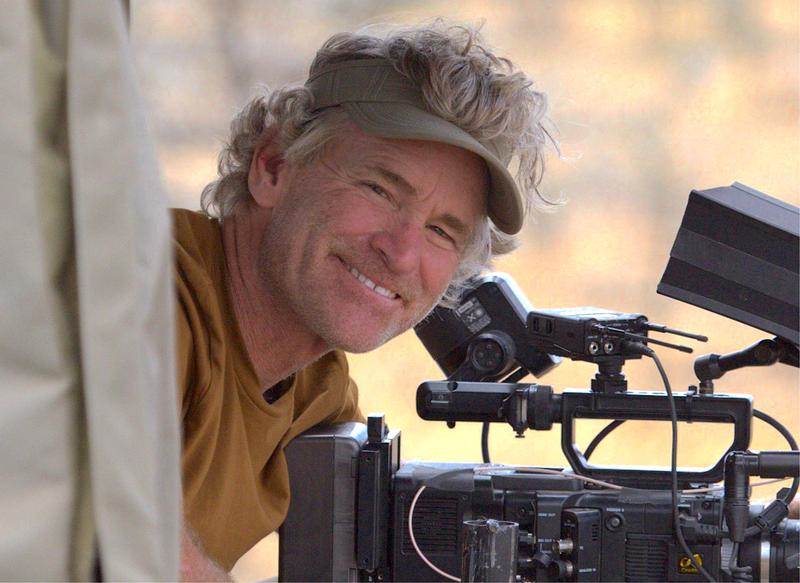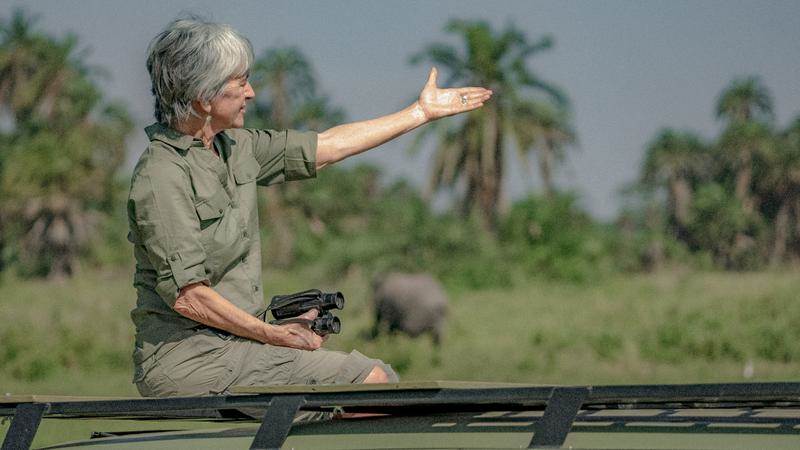Interview: “Secrets of the Elephants” Cinematographer Bob Poole Shares His Long History with Nat Geo and Elephants
From executive producer James Cameron, National Geographic’s Secrets of the Elephants introduces viewers to a world only known by pachyderms and the few humans lucky enough to be invited in. Cinematographer Bob Poole grew up in Kenya and got his start in wildlife filmmaking at the age of 17. In this interview, we discuss his history with both Nat Geo and elephants, his sister’s work with elephants, and what makes this follow up to Secrets of the Whales so special.

(Gina Poole)
Alex: Your career with National Geographic started when you were a teenager. How did you get involved with wildlife cinematography?
Bob Poole: I was raised in Kenya, my father worked in wildlife conservation and sadly, he died in an accident when I was 17. And before he passed away, he had organized a school holiday job for me working with a game capture team. We were catching Cape Buffalo, and we used a helicopter to dart them from the air. And one day, the helicopter pilot went off to fly for a National Geographic film crew that was in the area making a film about elephants. He invited me along, and the film crew took me on under their wing, I suppose, because they felt pity on me for my father's recent death. But it was definitely the beginning of my National Geographic career, I was 17 years old.
Alex: Wow. A very bittersweet story. I imagine it feels a little bit full circle that everything started for you at National Geographic with elephants, and here you are today on this four-part series that uncovers a lot of unknown information about them. Having spent a lot of your life in the presence of these beautiful giants, what's something new that you were surprised by as you spent time on this show?
Bob Poole: Well, I guess the most surprising thing for me was I filmed the birth of this baby desert elephant, which is just so extraordinary to get that. But then what happened afterward, the family left the mother and the auntie behind, and they had to walk over 45 kilometers in the hot sun to catch up to the family. The baby was less than two days old. That was new to me. I had filmed baby elephants dying in the hot sun before in the desert in Northern Africa, in Mali, and I definitely didn't want to see that happen again. And I was absolutely blown away that that little baby could go so far, so fast, under such harsh conditions. That was new to me.
Alex: The series chronicles four different types of elephants. In your experience, what is the biggest difference between them?
Bob Poole: Everybody always assumed it was African and Asian, but really forest elephants are quite remarkably different. They can have enormous tusks, they're smaller generally, hey look so much different, but they, in fact, really are different. Desert elephants are actually Savannah elephants, but they're so different in their own way. They seem to be taller, but it's because they have less body fat on their feet, and their feet seem to be bigger, probably for navigating over soft terrain in the sand. There's tremendous difference, and I think even when you watch the series, you'll see just how different they all really are.
Alex: Secrets of the Whales showcased just how similar the emotional lives of whales and humans can be. Do you think the same applies to elephants?
Bob Poole: Absolutely. I mean, one of the best things about being around elephants is they wear their emotions on their sleeves, on their trunks, on their feet. It's really easy to understand what they're thinking. And in fact, if you're around them long enough and if you study enough about them, you can actually understand a lot about what they're saying. I mean, I'm certainly no expert, but my older sister is the world's leading expert on this. She's in the series, and I've learned so much from her. But I can understand some of the calls, and I can predict what the elephants are going to do next based on what was just said. So that's pretty cool. And I think people who watch this are going to learn that elephants can communicate over long distances and frequencies that we can't hear. They can feel that sound coming through the ground in sensors in their feet. They communicate in all kinds of ways, not just vocally, but they have signals that they use to send. They talk to each other through sign language essentially, with visual cues from their trunks and their feet and their ears. They're amazing. And not to mention pheromones as well. They can communicate through smells, and that's pretty cool. So there's a ton to learn about elephants. They're fascinating animals, they're so much like us because of the way that they care for their families, and they have a unique perspective, I think they understand themselves, and they can be funny that way.

(National Geographic for Disney/Wim Vorster)
Alex: Since Secrets of the Whales was mostly underwater, Brian Skerry’s segments weren’t as involved as those of your sister, Joyce Poole, and Dr. Paula Kahumbu. Can you talk about working with humans in addition to elephants to help bring the story to life?
Bob Poole: Well, there's nothing for me better than working with my older sister. We've done for National Geographic quite a few films together, and it's amazing. As I said earlier, I think she is just phenomenal at understanding elephants, and I've learned so much from her, and I know the audience will too.
Alex: This is a passion project for James Cameron. Did you get to work directly with him? What was that process like?
Bob Poole: James Cameron is very passionate about this subject matter. I wasn't with him in the field, but did communicate with him on the film. And I know that he loves the way it looks, he likes the photography, he told me so, so that was cool. And I think that the whole idea of creating a series on amazing animals like elephants and whales and all the other species to come next, through Secrets of the, is just a great idea. It’s his idea and I'm just thrilled to be a part of it.
Alex: What was the production timeline like? I know that nature documentaries can take years to make. How long were you out in the field? Did you just work on the desert episode, or did you cross over with any others?
Bob Poole: So our series, Secrets of the Elephants, really had quite an impressively short timeframe as far as these big nature series can go. But the way we pulled that off was we had crews all over the place, and I was lucky because I got to do a lot of it. I was across the desert hour, and I was across the Savannah hour. It was really cool to be part of that. But we had amazing teams in Asia and in the forest in Central West Africa. I've filmed in Central West Africa quite a bit, and I've filmed elephants all over, including Asia, so I know the challenges that those crews were up against. Boy, they did a great job.
Alex: Nature cinematography is very different from the role of a cinematographer on a scripted film or series. What is your role like, compared to what most people think of as a conventional cinematographer?
Bob Poole: I think there's some crossover because all of us that are cinematographers enjoy working with photography and light. We don't get to direct our characters, but we definitely get to set up the scene in a sense of choosing our light angles. Hopefully, if we're ahead of the curve enough, we can get into position where we're going to get the best possible light. And we work with that tremendously. Of course, we work with all the same kinds of equipment. We choose our lenses and our cameras very carefully, the tools that we use for this, and we did use a lot of specialty gear on this series. There's a lot. And I know a lot of the people that are working on this series also do drama and other things, too. The difference though, I would say the main difference is you can't say, ‘Whoa, wait. Light's not just right, let's move over here.’ You've actually got to shoot when the action's happening. And so to do that, you really have to be prepared, you've got to have everything on standby, and you're just waiting for the moments to happen. And that's the trick, you've got to be there, and you've got to be ready, and you've got to be on standby. That's the name of the game in this one. And hopefully, you've chosen your light angles properly. You've still got to tell your story, it's still wide, medium, closeups, and every shot's got to tell a story. So you're multitasking a lot when you're a wildlife cinematographer.
Alex: Yeah. No re-shoots with nature. Well, thank you so much, Bob. I really appreciate your time. I'm excited to see the full series this Earth Day.
Bob Poole: Thank you for having me. It's been a pleasure.
Secrets of the Elephants premieres tonight at 9/8c on National Geographic. The entire series will be available to stream tomorrow, Earth Day, on Disney+.
